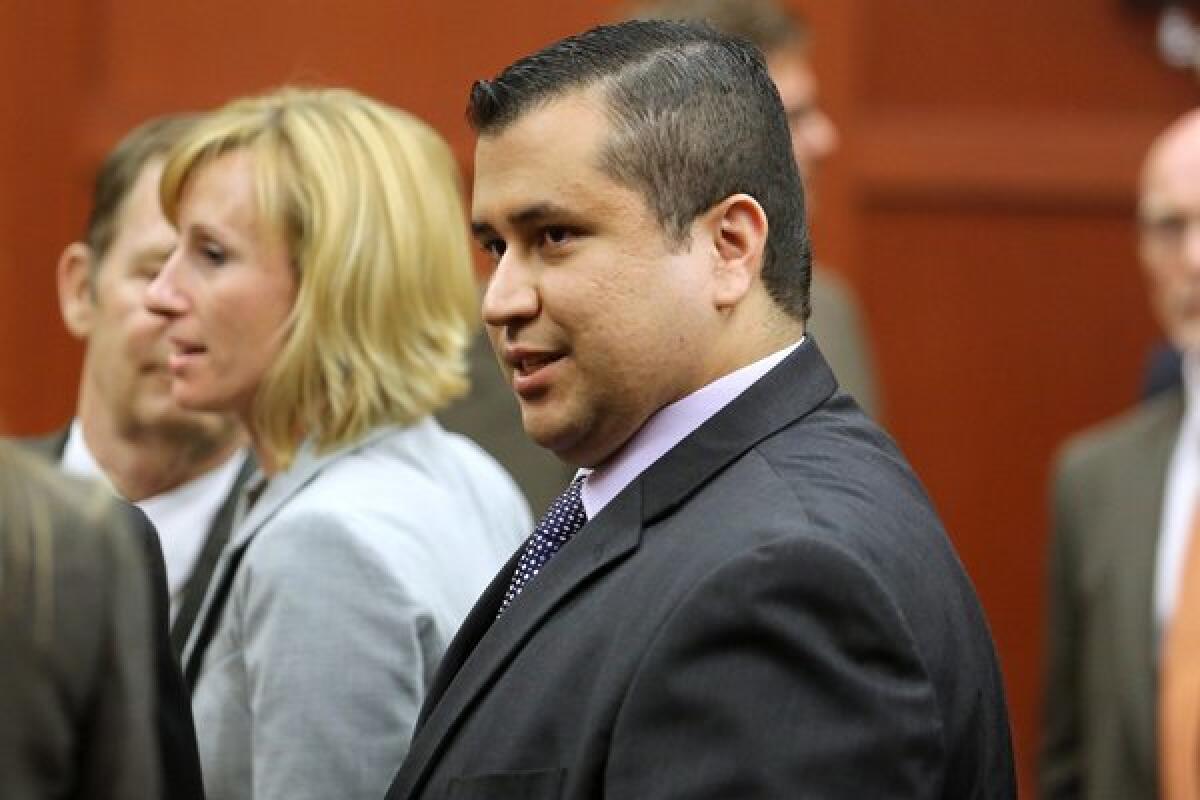Inside the Zimmerman juror room, it wasn’t a slam dunk

When the jury first began deliberations in the George Zimmerman murder trial last week, half of the six-woman panel thought he was guilty.
Of those leaning toward conviction, two thought he had committed manslaughter and one thought he was guilty of second-degree murder.
I find that tidbit — revealed by the only juror who has spoken publicly about the case so far — immensely comforting.
Even if their minds were eventually changed by the arguments of their peers, three jurors on the all-woman, mostly white panel believed that Zimmerman had committed a crime.
Nothing anyone says now can change the outcome of the case. But that information proves that this was not, as so many claimed during the trial and its aftermath, a slam-dunk case for the defense. Half the people sitting in judgment of Zimmerman thought that the prosecution, however fleetingly, had proved its case.
This should put to rest off-base accusations that the state was wrong to bring the case. The state acted appropriately; it was right to let a jury decide Zimmerman’s fate.
During her interview Monday night with CNN’s Anderson Cooper, one juror, among the trio who believed at the outset of deliberations that Zimmerman was not guilty, would allow herself to be identified only by her jury number, B-37. I can’t blame her for shielding her identity. Emotions are still running high and people are doing stupid things.
Plus, she has already felt the backlash.
On Monday, New York literary agent Sharlene Martin announced she had signed the juror and planned to shop a memoir about the case. It was an unseemly move by B-37 to try to cash in on her public service, and the timing was terrible. Tuesday, Martin said she’d made “a grave error in judgment” and dropped her new client.
In an email, Martin also conveyed this statement of regret from the juror:
“I realize it was necessary for our jury to be sequestered in order to protect our verdict from unfair outside influence, but that isolation shielded me from the depth of pain that exists among the general public over every aspect of this case. The potential book was always intended to be a respectful observation of the trial from my and my husband’s perspectives solely and it was to be an observation that our ‘system’ of justice can get so complicated that it creates a conflict with our ‘spirit’ of justice … I have realized that the best direction for me to go is away from writing any sort of book and return instead to my life as it was before I was called to sit on this jury.”
(If you want to hear more from this juror, Slate posted a video of her voir dire interview during jury selection. She said she did not know much about the case, and that in her home, newspapers “are used in the parrot’s cage, never read.” An animal rescuer who cares for a parrot, a crow, three dogs, four cats and a couple of lizards, she also said she had no time to spend on her computer, although she did note she was trying to get to the next level of “Candy Crush Saga,” a popular game on Facebook.)
CNN also landed an interview Monday with Rachel Jeantel, the 19-year-old friend of Trayvon Martin who was on the phone with him when Zimmerman began following him as he walked home from a 7-11.
Jeantel was an astonishingly colorful witness and the butt of cruel commentary about her looks, her intelligence and her crediblity.
Inarticulate in court, and at times nearly impossible to understand, she seemed like a sullen teenager when she sparred with defense attorneys, making it clear she did not want to be on the stand at all.
Monday, in an interview with Piers Morgan, looking considerably more glamorous than when she appeared in the Seminole County, Fla., courtroom, she explained that her severe underbite makes it difficult for her to pronounce certain words.
As it turned out, according to B-37, the jury did not believe her testimony.
“I didn’t think it was very credible,” said B-37, “but I felt very sorry for her. She didn’t ask to be in this place. … I think she felt inadequate toward everyone because of her education and her communication skills. I just felt sadness for her.”
I keep hearing people say that the defense was not based on Florida’s odious “stand-your-ground” law. And while it’s true, the defense did not explicitly use the law to present its case, what didn’t sink in until the judge read her jury instructions is that the jury was very explicitly told to take the law into account:
“If George Zimmerman was not engaged in an unlawful activity and was attacked in anyp lace where he had a right to be,” the judge told the jury, “he had no duty to retreat and had the right to stand his ground and meet force with force, including deadly force if he reasonably believed that it was necessary to do so to prevent death or great bodily harm to himself or another or to prevent the commission of a forcible felony.”
It was that instruction, Juror B-37 said, that made it impossible for the jury to convict, though they would have liked to find him guilty of something.
“Because … the two options you had, second degree murder or manslaughter, you felt neither applied?” Cooper asked.
“Right,” she replied. “Well, because of the heat of the moment and the stand your ground. He had a right to defend himself. If he felt threatened that his life was going to be taken away from him or he was going to have bodily harm, he had a right.”
The bottom line for this juror? Zimmerman “is a man whose heart was in the right place, but just got displaced by the vandalism in the neighborhoods, and wanting to catch these people so badly that he went above and beyond what he really should have done.”
His only crime? “I think he’s guilty of not using good judgment,” she said.
And despite his poor judgment, she’d have no problem with him carrying a gun or serving on her own neighborhood watch.
“I mean, I would feel comfortable having George,” she said, “but I think he’s learned a good lesson. … I think he just didn’t know when to stop. He was frustrated and things just got out of hand.”
I can’t help wonder: What lesson, exactly, does she thinks he’s learned?
ALSO:
CHP reopens all lanes on 5 freeway following tanker fire
Zimmerman verdict protests: 9 arrested in Oakland, police say
TV reporter, cameraman attacked by rogue Zimmerman verdict protesters
Twitter: @robinabcarian
More to Read
Sign up for Essential California
The most important California stories and recommendations in your inbox every morning.
You may occasionally receive promotional content from the Los Angeles Times.











